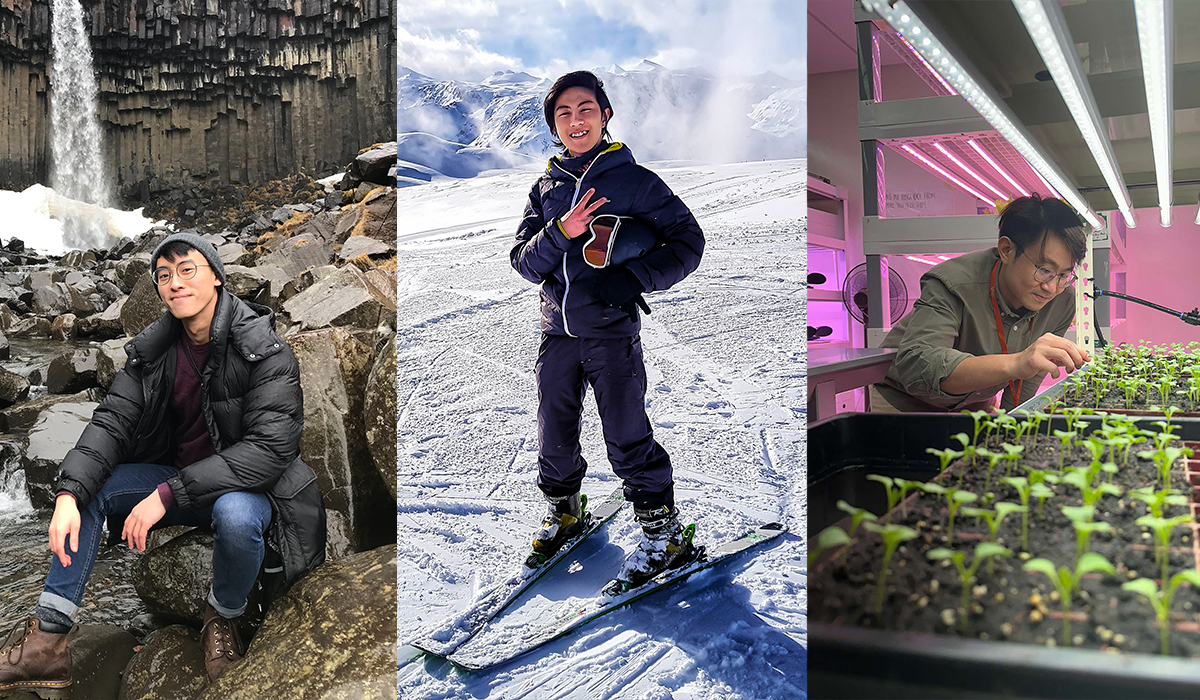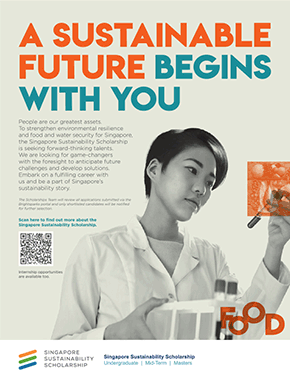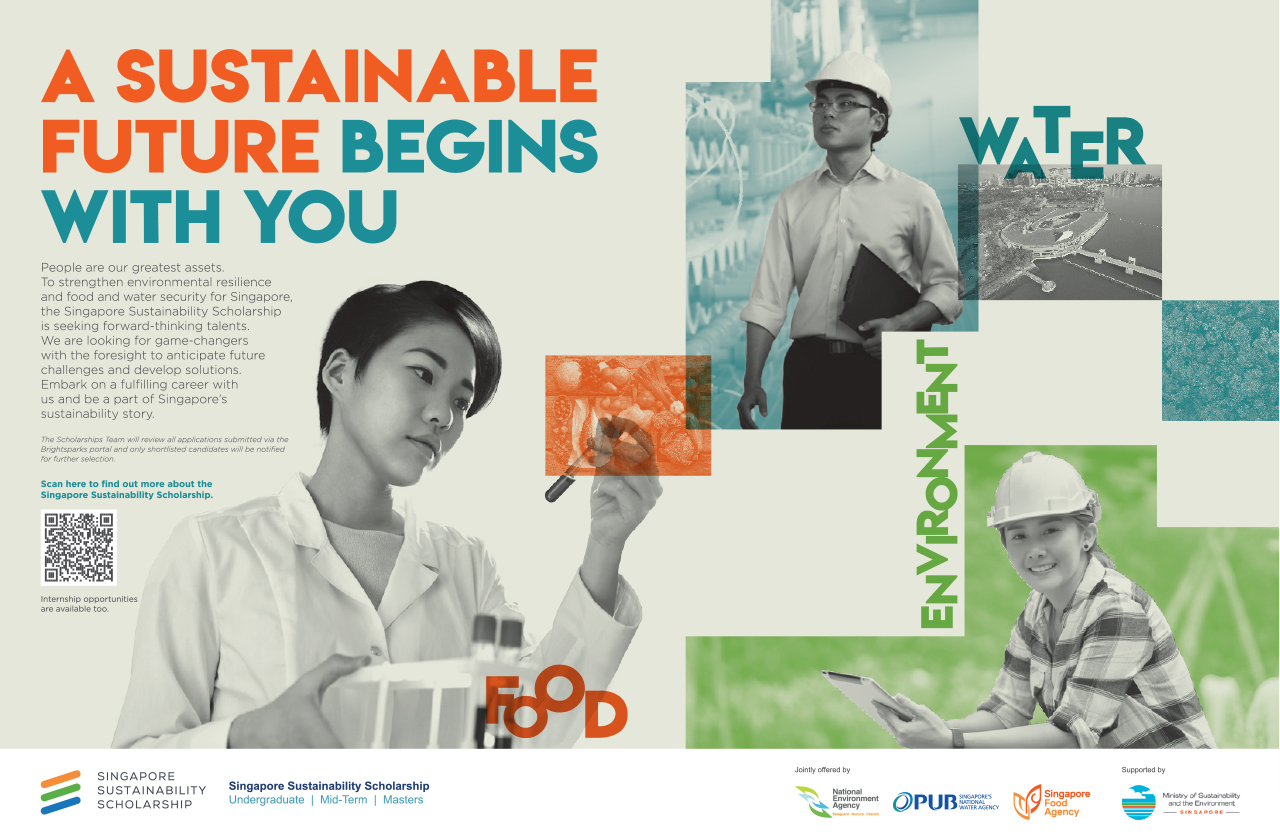Left: Wesley Ow Kai Rong is a recipient of the Singapore Sustainability Scholarship and holds a Bachelor of Science (Mechanical Engineering) from NUS and a Master of Sciences (Sustainable Energy Futures) from Imperial College London. Currently, he is an Assistant Manager in the Environmental Protection Policy Department, within the Policy Division at the National Environment Agency.
Middle: Sylvester Siew is an Engineer in the WSN Network Design and Construction Department at PUB, Singapore's National Water Agency. He was awarded the Singapore Sustainability Scholarship and holds a Bachelor's degree in Engineering Science (Civil) from Oxford University and a Master of Science in Sustainable Design and Construction from Stanford University.
Right: Chao Yu De is a recipient of the SFA Postgraduate (Mid-Term) Scholarship (Overseas). He has a Master of Biology (Integrated Masters) from the University of Leeds. He currently works as a Manager in the Urban Food Solutions Division at Singapore Food Agency.
With mounting global environmental challenges driven by climate change, concerns over food security and access to clean water have become increasingly prominent. The Singapore Sustainability Scholarship (SSS), jointly offered by the National Environment Agency (NEA), PUB, Singapore’s National Water Agency, and the Singapore Food Agency (SFA), serves as a testament to their dedication to addressing these critical issues.
The SSS is committed to cultivating a new generation of scholars dedicated to mitigating climate change, enhancing food and water security, and bolstering sustainability. Among these recipients, Wesley Ow Kai Rong, Sylvester Siew, and Chao Yu De have distinguished themselves as steadfast champions of sustainability and environmental transformation in Singapore.
Wesley holds a Bachelor of Engineering (Mechanical Engineering) from NUS and a Master of Sciences in Sustainable Energy Futures from Imperial College London. He is an Assistant Manager in the Environmental Protection Policy Department, within NEA’s Policy Division. His work involves reviewing and formulating environmental protection policies to safeguard Singapore’s air quality.
Sylvester Siew plays an integral role within PUB as an Engineer in the Water Supply Network (WSN) Design and Construction Department. His responsibilities encompass the laying of pipelines and construction of service reservoirs. He pursued a Bachelor’s degree in Engineering Science (Civil) at Oxford University and a Master of Science in Sustainable Design and Construction at Stanford University.
Chao Yu De, a Manager in SFA’s Urban Food Solutions (UFS) Division, focuses on translating research and innovations in food production technologies into the industry. His work centres on farm waste management and circularity, with the aim of reintegrating waste products into the food production value chain. Yu De holds a Master of Biology (Integrated Masters) from the University of Leeds.
We sat down with them to delve deeper into what fuels their remarkable commitment to pursuing sustainability.
Wesley, what motivated you to pursue a career in environmental protection?
I have always been fond of the natural environment and found solace in nature. Furthermore, I was drawn to the public sector as I felt that the work offered the opportunity to make a more tangible impact on society and is hence more fulfilling. The work in NEA meshed the two aspects together perfectly.
What sparked your interest in engineering, Sylvester?
I was motivated to acquire the skillset to design and create solutions for real-world problems, particularly those related to the pressing issue of the climate crisis. Furthermore, my passion for the sciences meant that engineering was a natural fit for my skills and interests.
Yu De, you received the SFA Postgraduate Scholarship which falls under the SSS umbrella. Can you tell us why you decided to apply for it?
When I first encountered the scholarship, my first inclination was not to apply because I was certain many more qualified individuals would do so. Eventually, I did, as it provided an attractive avenue to contribute meaningfully to food security, an industry I am passionate about. I realised that the first step was probably the hardest. I was my greatest foe, my biggest naysayer. So, I would encourage everyone thinking of applying for the scholarship to believe in themselves and not be afraid to take that first step.
Speaking of the scholarship, Wesley, how did it enhance your university experience?
Aside from the practical benefits of the scholarship, it gave me internship opportunities within NEA that deepened my understanding of the work that NEA does. In addition, the scholarship also supported opportunities to study overseas. I was able to go on a semestral student exchange programme at Loughborough University in the UK as well as attend an international winter programme at Hanyang University in Korea.
Sylvester, tell us more about the programmes you chose to pursue at university.
I spent the first two years of an engineering science degree at Oxford studying cross-cutting core topics across various engineering specialities. I believe that such breadth would be useful when dealing with complex environmental issues.
At the same time, as part of my civil engineering degree, I was exposed to the more practical design and construction work related to building infrastructure. When it comes to sustainability, building in a more sustainable manner and building sustainable infrastructure are two critical components. The Master’s at Stanford had the perfect curriculum for learning how to do so.
Yu De, how have you been able to utilise your university experience at work?
I was able to use my knowledge of biological processes such as fermentation and its pathways, nutritional requirements of livestock, and general pest management strategies. I also had the opportunity to gain a greater appreciation of concerns from industry and researchers.
However, it’s through my current work experience that I quickly realised the materials provided at university only cover so much. There are so many considerations on the ground and application-wise, which always presents a bigger challenge beyond a pure research setting. This is also what makes my work so exciting. The work is fast-paced, relevant, and constantly evolving, and the opportunities to learn are boundless.
Tell us more about your respective roles and responsibilities on the job.
Wesley: I am part of a team that oversees domestic air quality policies, covering areas from vehicular to industrial emissions. My work involves reviewing and formulating policies to reduce air pollution and safeguard air quality in Singapore. This consists of drafting policy proposals as well as engaging multiple stakeholders across the public and private sectors to ensure our policy proposals are sound.
Sylvester: As part of my role, I oversee the design and construction of large-diameter water pipelines. I usually monitor the progress of the project, assess claims, make payments, review design proposals, coordinate with other agencies, and draft contract documents and specifications.
Yu De, what is a typical day on the job like?
There isn’t a typical workday, as we rarely find ourselves stuck in a routine. Preparing for and attending internal or external meetings, writing reports, farm visits, visits to researchers, and running on-site trials are just examples of the work that we do. It takes me to different parts of Singapore. During busier periods, I hardly spend time just sitting in an office.
What do you hope to achieve in your career?
Wesley: I hope to be able to leave an impact on Singapore’s environment sector and ultimately contribute to a cleaner, greener, and more sustainable Singapore.
Sylvester: I would enjoy being exposed to more parts of the water loop such as coastal protection, drainage and water reclamation, while also being exposed to the different skillsets required for us to successfully deliver our mission at PUB.
Separately, I have a keen interest in environmental issues, so it would be great to get involved in PUB’s efforts to reach net zero by 2040 – including the adoption of energy efficiency solutions in our various treatment plants, exploration of carbon capture during our treatment processes and the deployment of floating solar.
Yu De: Personally, it is most important that I am in a career where I know I can contribute to the betterment of the quality of life of people around me and that the job is personally meaningful to me. I also hope to strive towards an environment that encourages and values growth, innovation, and impact throughout my career. Regardless of whether the position or quantifiable outcome is achieved, I think it is most important to consistently strive towards growth and development and aim for excellence in my career journey.
Sylvester, how would you describe the work culture at PUB?
Collaborative is the first word that comes to mind! Beyond that, there is a sense of purpose and mission amongst PUB officers that unites us all.
Finally, what are the possibilities for people who want to work in your agencies?
Wesley: The areas under NEA are broad and include pollution control, waste management, meteorology and public health matters. The type of work is also diverse – whether you enjoy work that involves being on the ground or strategic planning and policy – there are ample opportunities within NEA to explore.
Sylvester: As our mission “Supply Good Water. Reclaim Used Water. Tame Storm Water. Resist Rising Seas.” very succinctly states, the work in PUB is broadly divided into water supply, water reclamation, drainage, and coastal protection. Meanwhile, there is a need for a broad range of skill sets including day-to-day operations of our extensive network and multiple plants, regulating and setting policies, planning for future expansion and renewal as well as managing those projects during implementation. There is a wide range of roles that one can undertake at PUB, from planning to operations and policy work. Each role provides opportunities to work on different projects and interact with different people outside and within the organisation – ensuring that work will never be mundane!
Yu De: There are often concerns over how much of a positive impact one could have on the world, especially in light of increasingly global challenges like climate change, food insecurity, poverty, and malnutrition. Work in SFA is exciting because, with an increasingly global outlook in the workforce, the potential for a profound impact from SFA at a regional and global scale is increasingly relevant. I am planning to make further contributions beyond my current scope today, into a regional, global perspective. So, figure out what your “world” is, and what your motivations are, and carry that with you.




